英语必修ⅲ外研版module1europe教案period3
高中英语 Module 1 Europe学案外研版必修3

高中英语 Module 1 Europe学案外研版必修3Europe Period1 Introduction Teaching aims:1、Words connected with page1 -22、 Oral English about describing locationTeaching process: Ⅰ、 vocabulary 横过;穿过_________ boot _______ 大陆的;大洲的__________ face v、_______range______________ 建筑性建筑_________ 美术馆____________ symbol _________坐落于_______________ 建筑师_____________ project _______________sculpture____________ 发源地_____________ civilization_________ 古代的____ Ⅱ、presentation1、Have you ever traveled to any places? Where is it ?2、If I give you a chance to travel overseas, wheredo you want to travel most? And why?(let students tolearn to know the usage of “in” “on” “to”、)①、Alies____ the south ofB、② C is located ___the south ofD、/ C is located ____ the coast of D③、 E is situated ____ the south of F、/ E is situated ___ thecoast of F、( off the coast of 指在离陆地不远的海上 On the coast of 指在海岸线上的陆地上)Ⅲ、part1 on page1 Ⅳ、part2 on page2Exercises:1、There is a c_________ climate in that place、2、用 across 、through 、over 填空The Great Wall winds its way from west to east _______ the deserts ______ the mountain and ________ the valley until it reaches seas、3、 He lives in a small house ______ (面向)a park、4、 A dove(鸽子)is the s________ of peace、5、 There are some small islands ___ the coast and several villas(别墅)___ the coast ,too、( off\on )6、 A rainbow appeared in the sky、(同义句转换)In the sky _____________________、7、看起来像_____________8、山脉__________9、被覆盖____________ Book3 Module1 Europe Period3 Reading Ⅰ、phrases1、位于___________2、80亿游客___________________3、因。
高一英语Module1《Europe》教案(外研版必修3)
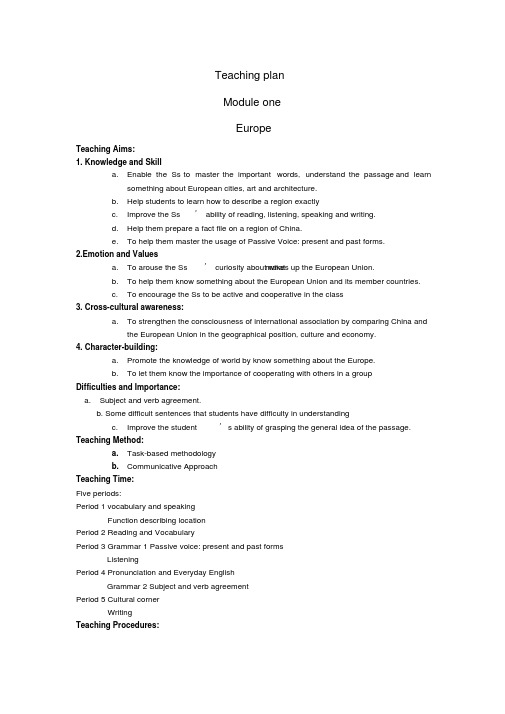
Teaching planModule oneEuropeTeaching Aims:1. Knowledge and Skilla.Enable the Ss to master the important words, understand the passage and learnsomething about European cities, art and architecture.b.Help students to learn how to describe a region exactlyc.Improve the Ss’ ability of reading, listening, speaking and writing.d.Help them prepare a fact file on a region of China.e.To help them master the usage of Passive Voice: present and past forms.2.Emotion and Valuesmakes up the European Union.a.To arouse the Ss’ curiosity about whatb.To help them know something about the European Union and its member countries.c.To encourage the Ss to be active and cooperative in the class3. Cross-cultural awareness:a.To strengthen the consciousness of international association by comparing China andthe European Union in the geographical position, culture and economy.4. Character-building:a.Promote the knowledge of world by know something about the Europe.b.To let them know the importance of cooperating with others in a groupDifficulties and Importance:a. Subject and verb agreement.b. Some difficult sentences that students have difficulty in understandingc.Improve the student’s ability of grasping the general idea of the passage. Teaching Method:a.Task-based methodologymunicative ApproachTeaching Time:Five periods:Period 1 vocabulary and speakingFunction describing locationPeriod 2 Reading and VocabularyPeriod 3 Grammar 1 Passive voice: present and past formsListeningPeriod 4 Pronunciation and Everyday EnglishGrammar 2 Subject and verb agreementPeriod 5 Cultural cornerWritingTeaching Procedures:。
高中英语 Module 1 Europe教案 外研版必修3

Module 1 EuropeMy fantastic trip to Spain【美文导读】充满惊喜的西班牙之旅让Anna忍不住把所遇到的奇闻轶事都写信告诉她的好朋友Laura。
我们也一起来分享一下她的快乐旅程吧!Dear Laura,Here I am in Granada,Spain!Can you believe it?I'm sitting in a park near the house I'm staying in. The weather is beautiful! The sun is shining and it's just beginning to get warm.My host mother Rosa is very nice.She's much younger than I expected,and she lives with her fiveyearold son Borja.He's so cute! Julie and I are staying in her apartment,along with two French girls and a boy from Michigan.The apartment is pretty crowded, but luckily I don't have to spend too much time there.I've spent the past few days exploring the town with Lauren and Caitlin.Yesterday we went to the Alhambra(西班牙格拉纳达的摩尔人王宫),which was one of the most amazing things I've ever seen.It's a huge fortress(要塞) built hundreds of years ago by the Muslims(伊斯兰教徒) who once lived in Granada.There are gardens and fountains and intricate carvings all through the fortress.It's huge -I could have spent days in there!That night we went to see flamenco dancing(弗拉曼戈舞). I loved it!You should have seen the way those dancers moved.After that, we went to dinner in the central square.The food here is pretty good—they have lots of “tapas,”which means appetizers(开胃菜).It's great to be visiting a foreign country whose language I actually speak. It's hard though,because whenever I have to talk to people I get nervous and forget everything.My Spanish is definitely getting better,though.I had a great conversation with my host mother yesterday.We talked about politics, and it was so interesting to hear about her views. That's what I love about language:it allows people from completely different backgrounds to communicate with one another and to begin to understand each other.I love the culture here.The best part is the “siesta(午睡)”.Every afternoon,the shops close and everyone goes home to eat lunch and take a nap(小睡).Then,they go back to work feeling completely refreshed! It's wonderful.I also love the fact that you can walk everywhere.Lauren,Caitlin,and I are planning on going to the beach this weekend.It's supposed to rain,but I hope it doesn't!We also want to go horse riding in the mountains.I can't wait.I'll be sure to write again soon! I miss you.Much love,Anna 【诱思导学】1.Do you want to go to Spain after reading the letter? List the reasons (at least two).【答案】 Yes.Visiting the amazing thing the Alhambra; enjoying the wonderful food and flamenco dancing; practicing Spanish, etc.2.Do you have a nap after lunch? What do you think of the siesta?【答案】Yes. After a nap(siesta), I can get down to my work feeling completely refreshed.Period ⅠPreviewing(教师用书独具)●教学目标本课时主要是通过学生对学案所给出的内容的学习,了解本课文中所出现的词汇,初步了解课文以及相关的背景知识,对下一堂课对课文的全面理解起到一个铺垫作用。
英语ⅲ外研版module1europe教案period3

英语ⅲ外研版module1europe教案period3整体设计教材分析本节为语法课,学习被动语态和句子中的主谓一致,教师通过讲解和练习,关心学生解决英语学习中的难点,培养抽象思维能力。
动词的语态要紧分为两种:主动语态和被动语态。
主动语态是指主语是谓语动词的执行者,二者为主动关系。
被动语态是指主语是谓语动作的承受者,二者为被动关系。
主谓一致指的是句子的谓语动词与其主语在数上必须保持一致,句子的主语是第三人称单数,主语是复数,那么谓语动词用复数。
三维目标1.知识与技能1)Helpstudentsrevisethesubjectandverbagreement.2)Helpstudentsrevisethepassivevoiceinthepresentandpastforms.3)Makethemmastersomegrammaticalrules.2.过程与方法1)Motivatestudents’enthusiasmintakingpartinclass.2)Individualworkandpairworktomakeeverystudentworkinclass.3.情感与价值Throughthestudyofthisperiodstudentswillsurelyknowmoreaboutthepassivevoiceas wellasthesubjectandverbagreement,sothattheyareabletocomeupwithidiomaticEnglish.教学重点1.Encouragestudentstosumupgrammaticalrulesthemselves.2.Encouragestudentstoapplythegrammaticalrulestopractice.教学难点Alltypesofthesubjectandverbagreement.教学方法1.Deduction.2.Practice.教学过程→Step1RevisionRevisewhatwehavelearnedlastclass.1.Makestudentsdiscussinpairstocompletethefollowingtable.(Showthefollowingonthescreen.)Famousplace(s)inthecity OtherspecialfeaturesCity’sname CountrythecitybelongstoParis France EiffelTower,theLouvre Restaurants,cafésandtheatres,famouswriters Barcelona Spain TheSagradaFamilia /Florence Italy TheUffiziPalace FamousforRenaissance,greatestpaintersAthens Greece TheParthenon Thebirthplaceofwesterncivilisation,bestwriters2.Encouragestudentstochooseacityfromthetableandintroduceittothewholeclassus ingtheinformation.→Step2Grammar1:PassiveVoice1.AskstudentstoreadthroughthesentencesinActivity1,Page5andthendiscusswiththeirpartnerthefollowingquestions:1)Whatdoestheword“by”inthefirstthreesentencestellyou?2)Isthereanydifferenceinmeaningbetweenthesetwosentences?Parisisvisitedbymorethaneightmilliontouristseveryyear.MorethaneightmilliontouristsvisitPariseveryyear.3)Whyistheword“by”notinthesentencesdande?(Afterafewminutes’discussiontheteachermayaskstudentstoanswerthequestions) Suggestedanswers:1)Ittellsuswhodidtheaction.(Ingrammaticalterms:Ittellsuswhotheagentwas.)2)Thefocusisdifferent.InthefirstsentenceitisPariswhichthatismoreimportant;w hileinthesecondonewearemoreinterestedinthetourists.3)Insentenced,becauseweunderstandthatitmeans“isknownbyeveryone”,andtheinclusionoftheagentwouldbesuperfluous,whileinsentenceebecausewearenotinterestedinwhobuil tit.2.OptionOneEncouragestudentstosumupthestructureofPassiveVoice.Taketheverb“do”asanexample.Writethefollowingontheblackboardandgivethemafewminutestocompletethetable.时态主动语态被动语态一般现在时do/does am/is/are+done一般过去时did was/were+done现在进行时am/is/are+doing am/is/are+being+done过去进行时was/were+doing was/were+being+done现在完成时have/has+done have/has+been+done过去完成时had+done had+been+done一般今后时will+do will+be+done过去今后时would+do would+be+done OptionTwoShowthegrammaticalrulesonthescreenandhavestudentsmakesenseofthem.被动语态的结构一般来说,只有需要动作对象的及物动词(短语)才有被动语态。
高一外研版必修三Module1Europe教案
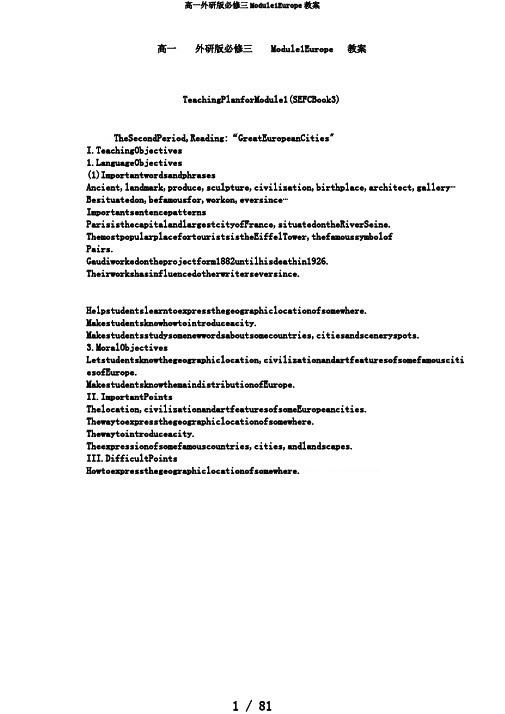
高一外研版必修三Module1Europe 教案TeachingPlanforModule1(SEFCBook3)TheSecondPeriod,Reading:“GreatEuropeanCities〞I.TeachingObjectivesnguageObjectives(1)ImportantwordsandphrasesAncient,landmark,produce,sculpture,civilization,birthplace,architect,gallery⋯Besituatedon,befamousfor,workon,eversince⋯ImportantsentencepatternsParisisthecapitalandlargestcityofFrance,situatedontheRiverSeine. ThemostpopularplacefortouristsistheEiffelTower,thefamoussymbolofPairs.Gaudiworkedontheprojectform1882untilhisdeathin1926. Theirworkshasinfluencedotherwriterseversince.Helpstudentslearntoexpressthegeographiclocationofsomewhere. Makestudentsknowhowtointroduceacity. Makestudentsstudysomenewwordsaboutsomecountries,citiesandsceneryspots.3.MoralObjectivesLetstudentsknowthegeographiclocation,civilizationandartfeaturesofsomefamousciti esofEurope.MakestudentsknowthemaindistributionofEurope.II.ImportantPointsThelocation,civilizationandartfeaturesofsomeEuropeancities. Thewaytoexpressthegeographiclocationofsomewhere.Thewaytointroduceacity.Theexpressionofsomefamouscountries,cities,andlandscapes.III.DifficultPointsHowtoexpressthegeographiclocationofsomewhere.Howtointroduceacitysimply.IV.TeachingMethodsReading,skimming,scanning,discussing,(AskingandAnswering,pictures,Groupwork,Explaining⋯) 2.TeachingAids:Multimediafacilities,photos,diagrams ⋯Guys,doyouliketravel?S:Yes.Wheredoyouwanttogo?France,ItalyOh,metoo.Franceisromanticandtheyarebeautiful!OK,now,Iwillshowyousomepicturesaboutsomescenicspots.Pleaselookatthescreen.ThefirstoneisProvence.Canyoutellmewhereisit?S:France.T:Good.ItisinFrance.Provenceisfamousforit’slavenderfarm.Justliketheflowerofpurpleinthispicture.ThesecondoneisCinqueTerre.ItisinVenice.ItisanItaliancity.CinqueTerreisformedof5smallvillages.Allofthemhavetheirownspecialcharacters.Theyarebeautiful.ThenextisSantorin.ItisclosetoAthens,acityinGreece.SantorinisanislandinAegeanSea.Thebuildinginthisislandislikethepictureshowstoyou.Themaincoloriswhiteandblue.OK,thepicturesareover.Haveyoufoundthecommonfeaturesfromthosepictures.Youcanthinkaboutitaccordingtoit’scountries.AllofthemareinEurope.Excellent.Inthosepictures,IhaveshowedyouFrance,ItalyandGreece.Allofthem AreinEurope.Sotoday,wewilllearnsomecitiesin Europe.Ourtopicis“GreatEuropeanCities〞.StepIIPre-reading(3mins)T:First,letuslearnsomenewwords.Lookatthescreen.AncientGreeceandancient Rome.Canyouguessthemeaning?S:古希腊,古罗马T:Welldone!Sothemeaningofancientis“古老的〞l ookattheexample.“Someancienttownshavewallsaroundthem“.it’smeaningis“有些古老的城市周围有城墙〞Thenext.TheEmpireStateBuildingisafamiliarlandmarkin NewYork.It means“帝国大厦是纽约的标志性建筑〞Sothemeaningof“landmark〞is“标志性建筑,地标〞Thethirdoneis“theChinesecivilizationisoneofthe oldestintheWorld.It’smeaningis“中国文化是世界上最古老的文化之一〞Sothe meaningof“civilization〞is“文化〞OK,It’sover.Haveyougotit?Yes.OK,let’smoveontothenextstep.Fastreading.StepIIIFast-reading(5mins) Letstudentsreadthewholepassagequickly,thenfinishtheactivity1. Nowpleaseskimthewholepassageandthenfinishactivity1onpage2.Matchthosesentenceswithpicturesandtellmewhichparagraphitbelongsto.Clear?Yes.4minutesforyou.Now,goahead.OK,time’sup.Anyvolunteer?(1).AlandmarkinParis(2).AnartgalleryinFlorence(3).AchurchinBarcelona(4).AbuildinginAthensEiffelTower UffiziPalaceParthenon D.TheSagradafamiliaStepIV Careful-reading(20mins)Learningthepassageparagraphbyparagraph.Firstletstudentsreadeachparagraphcarefully,thenfinishtablesofeveryparagraph.ThenItellthethemsomeinformation aboutthisparagraph.T:Thispassageisdividedinto4parts.TheyareParis,Barcelona,FlorenceandAthens.Let’slearn itparagraphbyparagraph.ThefirstparagraphisParis.Pleasereadthepassagecarefullyandattentionthe mainpointsonthisparagraph.Thenfillthetableonthescreen.3minutesforyou. Goahead.City ParisCountry FranceLocation OntheRiverSeineLandmark TheEiffelTowerWhyfamousRestaurants,cafesandthe atresLet’slookthisanswersagain.ParisisthecapitalandlargestcityofFrance.Issituated OntheRiverSeine.TheEiffelToweristhemostpopularplacetovisite.Itisalsofamousforit’srestaurants,cafesandtheatres.City BarcelonaCountry SpainLocation OnthenortheastcoastLandmark TheSagradaFamiliaWhyfamous-------------------------BarcelonaisthesecondlargestcityofSpain.Itissituatedonthenortheast coast,abovefivehundredkilometreseastoftheSpanishcapital,Madrid.TheSagradaFamilia isbuiltbyAntonioGaudifrom1882to1926.OK.Thenextparagraph.FlorenceCity FlorenceCountry ItalyLocation -----------------------Landmark TheUffiziPalace高一外研版必修三Module1Europe 教案Whyfamous TheRenaissanceFlorenceisanItaliancity.TheTheUffiziPalaceisanartgallery.TheRenaissanceisan artisticmovement.City AthensCountry GreeceLocation-----------------------Landmark TheParthenonWhyfamousBirthplaceofwesterncivil izationAthensisthecapitalofGreece.Alongtimeago,itisthemo stpowerfulcity.2.Answerthequestions.OK,somuchforthelearningofcarefulreading.Let’sdosomeexer cisestoconsolidatethepassage.Answerthequestions.(1)Whichofthecitiesarecapitalcities?-------ParisandAthens.(2)Whichoneissituatedonthecoast?--------ParisandBarcelona.(3)Whichisfamousforitsplacestoeat?--------Paris(4)Whichonesareorwereimportantcitiesforwritersandartists?Whichwastheworld’sgreatestcityalongtimeago?------Athens Trueorfalse.Welldone!Next,trueoffalse.Andifitisfalse,pleasetellwhyit isfalseandhowtocorrectit.Haveyougotit? TheEiffelTowerisatallbuildinginFrance. TherearealotofrestaurantsandcafesinParis. BarcelonaisthecapitalofSpain. TheChurchoftheSagradaFamiliawasbuiltin1926. TheartisticmovementcalledtheRenaissancebeganinFlorence. TheUffiziPalaceisafamoushotelinFlorence.Alongtimeago,Athenswastheworld’smostpowerfulcity.Sugges tedanswers:TTFFTFTStepVAfter-reading(12min)1.Retellthepassagebytheexerciseoffillingblanks.T:OK!Excellent!Nextweneedtoretellthepassage!Firstweretelltheformertwoparagraphsaccordingtothisshortpassage.Pleasecompletethoseblanks.Thenwewill readittogether.BeingthecapitalandlargestcityofFrance,_(1)_issituatedontheRiverSeine.Asoneofthemostbeautifulcitiesintheworld,Parisisvisitedbymorethan_(2)_touristeveryyear.Barcelonaisthesecondlargestcityof_(3)_andissituatedonthenortheastcoast,aboutfivehundredkilometerseastoftheSpanishcapital,_(4)_.T:OK,thelasttwoparagraphs.Doit. FlorenceisanItaliancitywhichbecamefamousbecauseoftheRenaissance,agreat_(5)_movementwhichbeganinthe1300sandlastedforthreehundredyears.Athens, thecapitalofGreece,isknownasThebirthplaceof_(6)_.Twothousandfourhundredyeasago,itwastheworld’s(7)_city.Suggestedanswers:(1)Paris(2)8million(3)Spain(4)Madrid(5)art(6)westerncivilization(7)powerfulGood!Ourreadingisover!Doyouhaveanyquestionaboutthispassage?No.2.Discussion(pairwork)OK,next,discussion.Whichofthosecitieswouldyoumostliketovisit?Andwhy?StepVI HomeworkAssignment(1min)Readthepassageagainandreviewthenewwordsandexpressions. studentsfinishtheexerciseofreadingonpage69and70.VI.BlackboardDesignancient:古老的,古代的标志性建筑,landmark:Module1GreatEuropeanCitiesHomework:Finishtheexercise地标Paris:巴黎ofreadingonpagecivilization:文化,文明Barcelona:巴塞罗那69and70.Florence:弗洛伦萨Athens:希腊。
高中英语 Module 1 Europe学案 外研版必修3
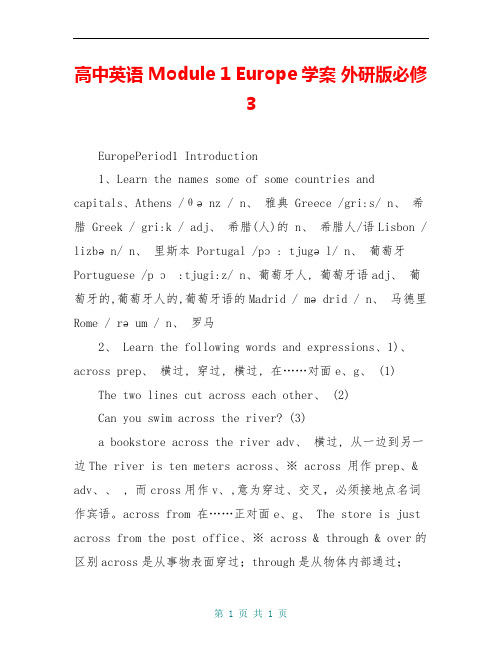
高中英语 Module 1 Europe学案外研版必修3EuropePeriod1 Introduction1、Learn the names some of some countries and capitals、Athens /θənz / n、雅典 Greece /gri:s/ n、希腊 Greek / gri:k / adj、希腊(人)的 n、希腊人/语Lisbon / lizbən/ n、里斯本 Portugal /pɔ: tjugəl/ n、葡萄牙Portuguese /p ɔ :tjugi:z/ n、葡萄牙人, 葡萄牙语adj、葡萄牙的,葡萄牙人的,葡萄牙语的Madrid / mədrid / n、马德里Rome / rəum / n、罗马2、 Learn the following words and expressions、1)、across prep、横过, 穿过, 横过, 在……对面e、g、 (1) The two lines cut across each other、 (2)Can you swim across the river? (3)a bookstore across the river adv、横过, 从一边到另一边The river is ten meters across、※ across 用作prep、& adv、、 , 而cross用作v、,意为穿过、交叉,必须接地点名词作宾语。
across from 在……正对面e、g、 The store is just across from the post office、※ across & through & over的区别across是从事物表面穿过;through是从物体内部通过;over 是越过,在…上方。
Ex、 The Great Wall winds its way from west to east ______________ the deserts______________ the mountain and ______________ the valley until it reaches seas、2)、 face n、脸;表情;面; e、g、(1)Mary buries her face in her hands、 (2)She turned her cheerful face to me、 v、面向;面对;正视be faced with 面对 in (the)face of 面对;不顾 e、g、 (1)The house that we live in faces to / towards south、(2)We should learn to face the difficulty with courage、(3)She is faced with a difficult decision、(4)He never shows any fear in face of danger、Ex、_________________ (face)with such a situation, she didn’t know what to do、_________________ (face)such a situation, she didn’t know what to do、_________________ _________________ such a difficult problem, I really didn’t know w hat to do、面对这么一个难题,我真的不知该做什么。
高中英语Module1Europe教案外研版必修3
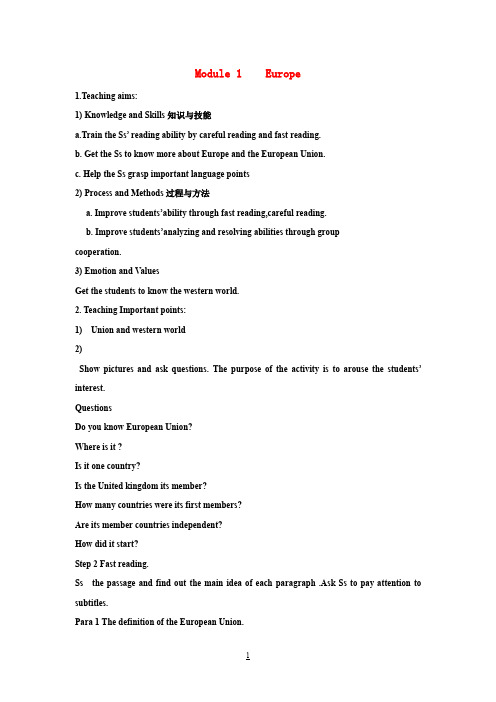
Module 1 Europe1.Teaching aims:1) Knowledge and Skills 知识与技能a.Train the Ss’ reading ability by careful reading and fast reading.b. Get the Ss to know more about Europe and the European Union.c. Help the Ss grasp important language points2) Process and Methods 过程与方法a. Improve students’ability through fast reading,careful reading.b. Improve students’analyzing and resolving abilities through groupcooperation.3) Emotion and ValuesGet the students to know the western world.2. Teaching Important points:1) Union and western world2)Show pictures and ask questions. The purpose of the activity is to arouse the students’interest.QuestionsDo you know European Union?Where is it ?Is it one country?Is the United kingdom its member?How many countries were its first members?Are its member countries independent?How did it start?Step 2 Fast reading.Ss the passage and find out the main idea of each paragraph .Ask Ss to pay attention to subtitles.Para 1 The definition of the European Union.Para 2 How it startPara 3 The members of the European Union.Step 3 Analyze each paragraph.Paragraph1:1)Is the European Union an organization?The European Union is an organization of European countries.2)Do the countries governments?The countries are independent and are governed in different ways.3)What does each government do to the EU?Each of them sends representatives to the European Parliament, which each of the member countries.Para 2 & 3Fill in the blank according to paragraph 2 & 3The European Union ( EU)Step 5 DiscussionIn terms of size and population, Union compared with China?Step 6 HomeworkFinish exercises from P16-18 on 新新学案。
高一英语教案:Module 1 Europe(外研必修3)

Module 1 EuropeLearning paper 1 words and phrases Learning aims: to learn the words and phrases and master their usage Learning methods: practicing1. face cn. 脸,脸色;某物的前面,面子,尊严lose face face to face in the face ofv. 朝,向,面向,正视,面临The house faces the park.这房子面向公园。
be faced with face up to face the music_______many debts, Tom had to find another job.A. Facing withB. Having faced withC.Bbeing faced withD. Faced with2. across prep <方向)横过,从这边到那边;<位置)在对面,在那一边(1> He swam across the river.The policeman helped the old man across the street.(2> He lived across the street.He is _____ the street.A. acrossingB. acrossC. walking crossD. walking3. range n.<变动或浮动的)范围,界限,区域;种类,一系列v.<在一定范围内)变化,变动eg. The child was now out of her range of vision.这孩子已经走出了她的视线。
She has had a number of different jobs, ranging from chief to swimming instructor. 她作过许多不同的工作,从厨师到游泳教练。
高一英语外研版3教案:Module1EuropePeriod3含解析

Module 1EuropePeriod 3 Grammar 1 & Grammar 2 & Writing错误!教学内容分析本节课主要内容包括语法一,语法二和写作。
语法一主要复习被动语态的现在式和过去式,让学生们在被动语态的运用中熟练掌握其过去式和现在式的基本构成;语法二主要学习句子中的主谓一致,掌握一些特殊的主语和谓语的一致原则,做到正确运用;写作部分主要是提高学生的写作能力,运用前面课文中的信息及借助其他信息途径如图书馆和网络,相对系统全面地介绍一个欧洲大城市,并能工整准确地写出其介绍。
三维目标设计Knowledge and skills1.To help the students learn the following words and expressions in this period.Words:sign,agreementExpressions:have(got).。
.in common,refer to2.To help the students revise the following words and expressions in this period。
Words:design,neither,nor,none,eachExpressions:think of,a number of,neither of,none of,each of...3.To help the students learn the usage of the present and past form of passive voice and the subject and verb agreement.4.To help the students learn how to write a brief introduction of a great European city。
Process and methods1.To encourage the students to take an active part in the learning activities by giving them clear instructions on what to do while reading a new passage。
高一 外研版必修三Module1 Europe 教案
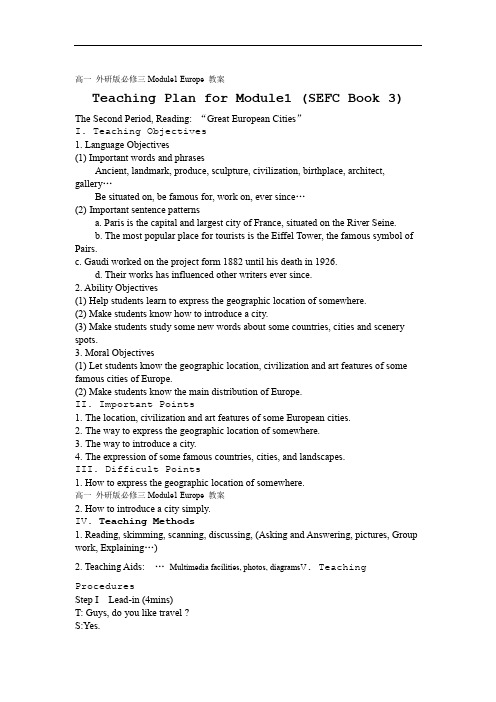
高一外研版必修三Module1 Europe 教案Teaching Plan for Module1 (SEFC Book 3) The Second Period, Reading: “Great European Cities”I. Teaching Objectives1. Language Objectives(1) Important words and phrasesAncient, landmark, produce, sculpture, civilization, birthplace, architect, gallery…Be situated on, be famous for, work on, ever since…(2)Important sentence patternsa. Paris is the capital and largest city of France, situated on the River Seine.b. The most popular place for tourists is the Eiffel Tower, the famous symbol of Pairs.c. Gaudi worked on the project form 1882 until his death in 1926.d. Their works has influenced other writers ever since.2. Ability Objectives(1) Help students learn to express the geographic location of somewhere.(2) Make students know how to introduce a city.(3) Make students study some new words about some countries, cities and scenery spots.3. Moral Objectives(1) Let students know the geographic location, civilization and art features of some famous cities of Europe.(2) Make students know the main distribution of Europe.II. Important Points1.The location, civilization and art features of some European cities.2.The way to express the geographic location of somewhere.3.The way to introduce a city.4.The expression of some famous countries, cities, and landscapes.III. Difficult Points1. How to express the geographic location of somewhere.高一外研版必修三Module1 Europe 教案2. How to introduce a city simply.IV. Teaching Methods1. Reading, skimming, scanning, discussing, (Asking and Answering, pictures, Group work, Explaining…)2. Teaching Aids: …Multimedia facilities, photos, diagrams V. TeachingProceduresStep I Lead-in (4mins)T: Guys, do you like travel ?S:Yes.T: Where do you want to go?S: France, ItalyT: Oh, me too. France is romantic and they are beautiful !OK, now, I will show you some pictures about some scenic spots. Please look at thescreen.The first one is Provence. Can you tell me where is it?S: France.T:Good. It is in France. Provence is famous for it's lavender farm. Just like the flower ofpurple in this picture.The second one is Cinque Terre. It is in Venice. It is an Italian city. CinqueTerre isformed of 5 small villages. All of them have their own special characters.They arebeautiful.The next is Santorin. It is close to Athens, a city in Greece. Santorin is anisland inAegean Sea. The building in this island is like the picture shows to you. Themain coloris white and blue.from thosefound the common features you Have over. are OK, the pictures高一外研版必修三Module1 Europe 教案pictures.You can think about it according to it's countries.S: All of them are in Europe.T: Excellent. In those pictures, I have showed you France, Italy and Greece. Allof themAre in Europe. So today , we will learn some cities in Europe. Our topic is “GreatEuropean Cities.”Step II Pre-reading (3mins)T:First, let us learn some new words. Look at the screen. Ancient Greece and ancientRome. Can you guess the meaning?S:古希腊,古罗马T: Well done!So the meaning of ancient is “古老的”look at the example.“Some ancient towns have walls around them. “it's meaning is “有些古老的城市周围有城墙”The next . The Empire State Building is a familiar landmark in New York.It means “帝国大厦是纽约的标志性建筑”So the meaning of “landmark”is “标志性建筑,地标”The third one is “the Chinese civilization is one of the oldest in theWorld. It's meaning is “中国文化是世界上最古老的文化之一”So the meaning of“civilization”is “文化”OK,It's over. Have you got it?S: Yes.T: OK, let's move on to the next step. Fast reading.Step III Fast-reading (5mins)Let students read the whole passage quickly, then finish the activity 1.T: Now please skim the whole passage and then finish activity 1 on page 2. Match those高一外研版必修三Module1 Europe 教案sentences with pictures and tell me which paragraph it belongs to. Clear?S: Yes.T: 4 minutes for you. Now, go ahead.OK, time's up. Any volunteer?(1). A landmark in Paris(2). An art gallery in Florence(3). A church in Barcelona(4). A building in AthensA.The Eiffel Tower C.The Uffizi PalaceB.The Parthenon D. The Sagrada familia Step IV Careful-reading (20mins)1.Learning the passage paragraph by paragraph. First let students read each paragraphcarefully, then finish tables of every paragraph. Then I tell the them some informationabout this paragraph.T: This passage is divided into 4 parts. They are Paris, Barcelona, Florence and Athens.高一外研版必修三Module1 Europe 教案Let's learn it paragraph by paragraph.The first paragraph is Paris. Please read the passage carefully and attention the mainpoints on this paragraph. Then fill the table on the screen. 3 minutes for you.T: Let's look this answers again. Paris is the capital and largest city of France. Is situatedOn the River Seine. The Eiffel Tower is the most popular place to visite. It is alsofamous for it's restaurants,cafes and theatres.T: Barcelona is the second largest city of Spain. It is situated on the northeast coast ,above five hundred kilometres east of the Spanish capital, Madrid. The Sagrada Familiais built by Antonio Gaudi from 1882 to 1926.高一外研版必修三Module1 Europe 教案Why famous The RenaissanceT: Florence is an Italian city. The The Uffizi Palace is an art gallery. The Renaissance is anT: Athens is the capital of Greece. A long time ago ,it is the most powerful city. 2. Answer the questions.T: OK, so much for the learning of careful reading . Let's do some exercises to consolidate the passage .Answer the questions.(1) Which of the cities are capital cities? -------Paris and Athens.(2) Which one is situated on the coast?--------Paris and Barcelona.(3) Which is famous for its places to eat?--------Paris(4) Which ones are or were important cities for writers and artists?-------Paris, Florence and Athens(5) Which was the world's greatest city a long time ago?------Athens3. True or false .T: Well done! Next, true of false. And if it is false ,please tell why it is false and how tocorrect it. Have you got it?(1) The Eiffel Tower is a tall building in France.(2) There are a lot of restaurants and cafes in Paris.(3) Barcelona is the capital of Spain.(4) The Church of the Sagrada Familia was built in 1926.(5) The artistic movement called the Renaissance began in Florence.(6) The Uffizi Palace is a famous hotel in Florence.(7) A long time ago, Athens was the world's most powerful city. Suggested answers: T T F F T F T高一外研版必修三Module1 Europe 教案Step V After-reading (12min)1. Retell the passage by the exercise of filling blanks.T: OK! Excellent! Next we need to retell the passage! First we retell the former twoparagraphs according to this short passage. Please complete those blanks. Then we willread it together.Being the capital and largest city of France, _(1)_is situated on the River Seine. As oneof the most beautiful cities in the world, Paris is visited by more than _(2)_ touristevery year. Barcelona is the second largest city of _(3)_ and is situated on the northeastcoast, about five hundred kilometers east of the Spanish capital,_(4)_.T: OK, the last two paragraphs. Do it .Florence is an Italian city which became famous because of the Renaissance, a great_(5)_ movement which began in the 1300s and lasted for three hundred years. Athens,the capital of Greece, is known as The birthplace of _(6)_. Two thousand four hundredyeas ago, it was the world's_(7)_city.Suggested answers:(1) Paris (2) 8 million (3) Spain (4) Madrid (5)art (6)western civilization (7) powerfulT: Good! Our reading is over! Do you have any question about this passage?S: No.2.Discussion (pair work)T: OK, next , discussion.Which of those cities would you most like to visit? And why?Homework Assignment (1 min)Step VI高一外研版必修三Module1 Europe 教案1. Read the passage again and review the new words and expressions.2.Let students finish the exercise of reading on page 69 and 70.。
高中英语 Module1 Europe 第3课时学案 外研版必修3

高中英语 Module1 Europe 第3课时学案外研版必修3Points学习目标:1、能简单描写自己的高中生活2、掌握文章中包含的重要语言点3、感受高中生活,热爱生活,热爱学习学习重点:掌握文章中包含的重要语言点学习难点:能简单描写自己的高中生活课前预习使用说明与学法指导:1、在语境中掌握重点单词、短语和句型的用法2、15分钟之内完成教材助读:1、France is Europe’s third largest country and faces the United Kingdom across the English Channel2、 the Church of the Sagrada Familia,which was designed by an architect called Antonio Gaudi、预习自测:1、中学生面临着文理科的选择。
(face)(xx安徽书面表达)几个月前,我去超市买了一双新鞋,因为新年就要临近了。
(because)(xx湖南书面表达)我的疑问:_________________________________________________________ _________________________________________________________ ________________________课内探究质疑探究:重点句型 Paris is the capital and largest city of France, situated on the River Seine、巴黎是法国首都和最大的城市。
句中situated on the River Seine是过去分词作定语。
作定语用的过去分词相当于形容词,其逻辑主语就是它所修饰的名词。
及物动词的过去分词作定语,既表被动又表完成;不及物动词的过去分词作定语,只表完成。
1)过去分词用作定语,常可置于其所修饰的名词之前。
英语:Module1《Europe》教案(3)(外研版必修3)
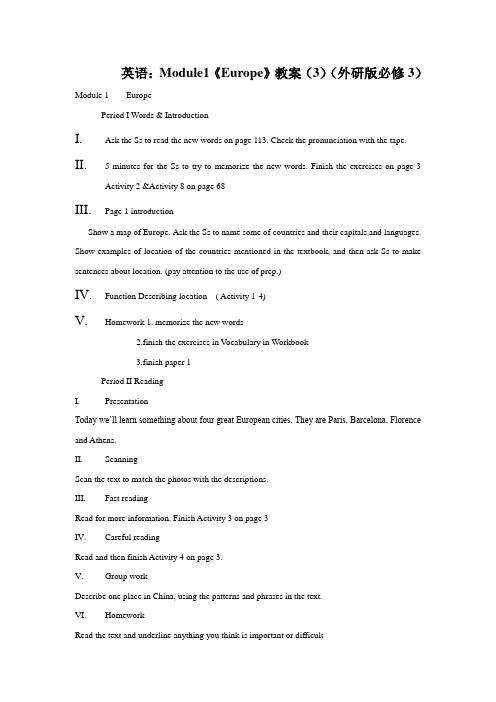
英语:Module1《Europe》教案(3)(外研版必修3)Module 1 EuropePeriod I Words & IntroductionI.Ask the Ss to read the new words on page 113. Check the pronunciation with the tape. II. 5 minutes for the Ss to try to memorize the new words. Finish the exercises on page 3 Activity 2 &Activity 8 on page 68III.Page 1 introductionShow a map of Europe. Ask the Ss to name some of countries and their capitals and languages. Show examples of location of the countries mentioned in the textbook, and then ask Ss to make sentences about location. (pay attention to the use of prep.)IV.Function Describing location ( Activity 1-4)V.Homework 1. memorize the new words2.finish the exercises in V ocabulary in Workbook3.finish paper 1Period II ReadingI.PresentationToday we’ll learn something about four great European cities. They are Paris, Barcelona, Florence and Athens.II.ScanningScan the text to match the photos with the descriptions.III.Fast readingRead for more information. Finish Activity 3 on page 3IV.Careful readingRead and then finish Activity 4 on page 3.V.Group workDescribe one place in China, using the patterns and phrases in the text.VI.HomeworkRead the text and underline anything you think is important or difficultPeriod III Language PointsI.Deal with the language points if there is any.II.Finish Paper 2nguage points1.Paris is the capital and largest city of France, situated on the River Seine. 过去分词作定语2.The most popular place for tourists is the Eiffel Tower, the famous symbol of Paris. 同位语3.One of the world’s largest art galleries, the Louvre, is also located in Paris.the Louvre 同位语be located in/on 位于4.be famous forbe famous as5.One of Barcelona’s most famous landmarks is the Church of the Sagrada Familia, which wasdesigned by an architect called Antonio Gaudi.Which 引导定语从句Called 过去分词作定语6.work on 从事7.from…to8.Florence is an Italian city which became famous because of the Renaissance, a great artisticmovement which began in the 1300s and lasted for three hundred years.两个which 引导的定语从句a great artistic movement 作the Renaissance 的同位语9. of all time 有史以来Period IV Reading ComprehensionI.RevisionCheck the homeworkII.Reading comprehensionIn this part, deal with the passages in Cultural Corner on page 9 and on page 69. Just go through the text and finish the exercises related.Period V GrammarGrammar 1 passive voice: present and past formsGrammar 2 subject and verb agreementGo through the grammar rules and finish the exercises on page 5&7Finish exercises in workbookFinish Paper 3Period VI listening &Period VII PracticeDeal with all the exercises and go over what we have learned in this module Finish paper 4。
外研高中必修3Module1Europe教案设计
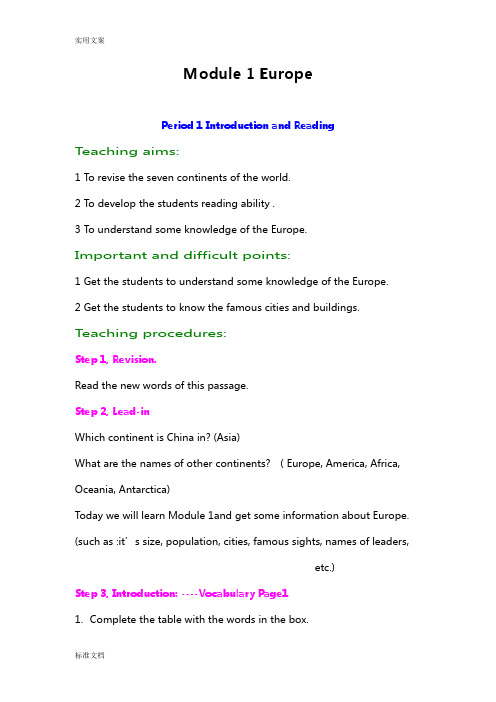
Module 1 EuropePeriod 1 Introduction and ReadingT eaching aims:1 To revise the seven continents of the world.2 To develop the students reading ability .3 To understand some knowledge of the Europe.Important and difficult points:1 Get the students to understand some knowledge of the Europe.2 Get the students to know the famous cities and buildings.T eaching procedures:Step 1, Revision.Read the new words of this passage.Step 2, Lead-inWhich continent is China in? (Asia)What are the names of other continents? ( Europe, America, Africa, Oceania, Antarctica)Today we will learn Module 1and get some information about Europe. (such as :it’s size, population, cities, famous sights, names of leaders,etc.)Step 3, Introduction: ----Vocabulary Page1plete the table with the words in the box.(1)Get the Ss to read the words in the box after me.(2)Get the Ss to read them.(3) Get the Ss to divide the words into three groups. First get them to finish it by themselves and then check the answers together.2. Check the meaning of the words and phrases. Read the information and find the countries on the map above.(1) Get some Ss to read the words and phrase in the box and get them to tell us the meaning.(2) Read the information and find the countries on the map above. That is to say, match the information with the countries on the map.(3) Check the answers together.Answers: (1-f; 2-a; 3-c; 4-e; 5-d; 6-b)Step 4, Fast-reading page 2Activity 1.Read the passage and match the photos with these descriptions.1. A2. C3. D4. BStep 5. Further-readingActivity 3: Read the passage and answer these questions.(1)Ask the Ss to read the passage again and answer the questions individually.(2)Call back the answers from the whole class, having one student askthe question and another answer it .Activity4 Decide if theses sentences are true (T) of false(F)T: 1, 2, 5, 7, 8F: 3, 4, 6Step 6. VocabularyActivity2 Match the words in the box with their definitions. Answers:(1)architect (2)locate(3) landmark(4) writer(5) gallery(6) sculpture (7)ancientStep 7. Discussion.Discuss the following questions in group of four and choose one of them to answer them.(1)What did you know about these cities before you read the text?(2)What new information did you learn?(3)Which of them would you most like to visit?Step 8. Homework.1. Workbook –on Page 68.2 .Write a short passage about your favorite city.Period 2 ListeningPronunciation and Everyday EnglishTeaching aims:1 To listen to the description about the cities Cardiff, Edinburgh, Valencia.2 To learn to listen the specific information.3 To learn to use question tags.Difficult and important points:Get the students to express question tags.Teaching procedures:Step 1. RevisionCheck the homework.Step 2. ListeningPage31) Before listening---Read the following questions.2) While listening--- Listen to the tape twice and answer the questions. Ex :1, 2 ,33) After Listening--- Check the answers.Ex1:(1) In Scotland (2) in Wales (3) in SpainEx2:Amy comes from CardiffHelen comes from Edinburgh.Carols comes from ValenciaCarols is studying English.Helen is studying French and ChineseAmy is studying German and Russian.Ex3:T----1. 5 F---2. 3. 4Step 3. Pronunciation and Everyday EnglishPage8(1)Let the Ss look at the question tags in the conversation.(2)Work in pairs and practice the conversation in Activity 1.(3)Work in pairs and ask real questions or check what you know. Step 4. HomeworkFinish off the workbook.Period 3 Cultural Corner and Writing Teaching aims:1 To learn something about the European Union.2. To develop the students’reading skills.3. To learn to prepare a fact file on a region of China.Difficult and important points:1 Get the students to learn the symbol of the European Union.2 Get the students to understand some important sentences. Teaching procedures:Step 1. RevisionRead the words and have a dictation.Step 2. Lead inThere is an important organisation in Europe. What is it called? (the European Union.)Now let’s get some information about the European Union.Step 3. Fast-readingRead the passage and answer the questions.1.What is the European Union?2.How did it start?3. How many countries belong to it now?Step 4. Further readingRead the passage again and1.Find the names of three first members and three new members of theEuropean Union?(France, Germany, Belgium,) ( Australia, Denmark, Finland)2. In terms of size and population, how big is the European Union compared with China? (open)Step 5. Listening and explanationSeveral phrases1.on the other hand: 另一方面,反过来说2.in the 1950s:二十世纪五十年代3.little by little:逐渐的4.the second half of the twentieth century:二十世纪后半期5. have a population of 有多少的人口Step 6. Discussion1.Choose a region of China and prepare a fact file about it .1)the main towns and cities in the region2) the main geographical features (mountains, rivers, lakes, deserts.)3) the main industries and / or main agricultural produdce.4) the main places for tourists.Step 7. Writing1. Make a poster display of your fact file.2. Choose one of the cities from Great European Cities.Step 8. HomeworkFinish off your teaching plans.---- language pointsPeriod 4 FunctionGrammar and Language pointsTeaching aims:1 To learn new words and expressions and learn how to use them.2 To review of the passive voices.3.主谓一致4.表示方位的介词Difficult and important points:1 Get the students to know how to use passive voices:一般现在时和一般过去时的被动语态2 The usage of:words: face , design , produce, controlphrases: be situated/ located , little by little, on the other hand ,compare with because of , in terms ofTeaching procedures:Step 1. RevisionRead the sentences and find out what grammar are they?1 Paris is visited by more than eight million tourists every year.2. Tthe Sagrada Familia was designed by an architect called Antonio Guadi.3. Florence’s most beautiful painting and sculptures were produced by greatest artists such as Leonardo da Vici.4. Athens is known as the birthplace of western civilization.5. The Parthenon was built during this period.Step 2. Presentation(一)被动语态(A)被动语态的基本形式是: be +过去分词根据时态的不同, be的形式有所变化.(1) 一般现在时的被动语态: am/is /are+过去分词(口语可用get/become或got /became)(2) 一般过去时的被动语态:was /were+过去分词(B) 被动语态的基本用法:不知道或没有必要提到动作的执行者是谁时用被动语态.强调或突出动作的承受者常用被动语态.(有时可省略).(C)使用被动语态应注意的几个问题.(1) 主动变被动时双宾语的变化. 看下列例句eg: 我朋友在我生日时送我一本有趣的书.My friend gave me an interesting book on my birthday.---- An interesting book was given to me (by my friend) on my birthday. --- -I was given an interesting book (by my friend) on my birthday. (2) 主动变被动时,宾补成主补(位置不变);作宾补的省略to的不定时在被动语态中应加to.eg: 老板让他整天工作.The boss made him work all day long.---- He was made to work all day long (by the boss).(3) 短语动词变被动语态时,勿要掉”尾巴”.eg: 孩子们被他照顾的很好.-----The children were taken good care of ( by her).eg: 要注意一下你的发音和拼写.-----Your pronunciation and spelling should be paid attention to. (4) 情态动词和be going to, be to, be sure to ,used to, have to, had better 等结构变被动语态,只需将它们后面的动词原形变为be +过去分词(5) 当句子的谓语为say, believe, expect, think, know, write, consider, report等时,被动语态有两种形式:a: 谓语动词用被动语态,动词不定时作主补.b 用作形式主语,真正的主语在后面用主语从句来表示.例如:eg: 人们说她是个聪明的孩子.People say he is a smart boy.---It is know that he is a smart boy.--- He is said to be a smart boy.人们都知道纸是最先在中国制造的.People know paper was made in China first.---- It is known that paper was made in China.---- Paper was known to be made in China.类似句型有: It is said/ know/ suggested/believed/ hoped /thought that…..(D) Practice: Rewrite the sentences in the passive voice. Page5Activity2 ---- answers:1. Florence is visited by about a million tourists each year.2. London was visited by ten million people last year.3. The Mona Lisa was painted by Leonardo da Vici.4. The Mona Lisa wasn’t painted by Picasso.5. The Great Wall of China was built by thousands of workers.(二)主谓一致:(A).Read the sentences and answer : what have the words family/ team/ and class got in common?(1)My family lives in Cardiff.(2)Our soccer team is fantastic.(3)The whole class is here.(B)句子的谓语动词和句子的主语尽管保持着语法一致,逻辑一致和就近一致原则,但总的来说,句子的主语的确定对于谓语动词的选定起着至关重要的作用。
高一英语 moudle1 Europe教案 外研社必修3
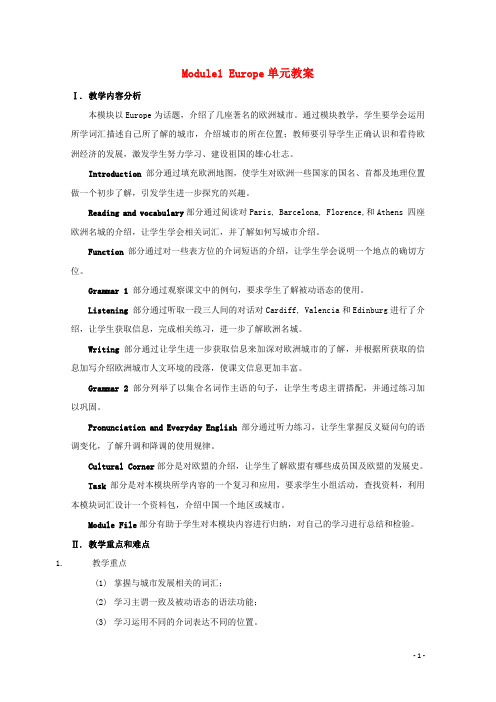
Module1 Europe单元教案Ⅰ. 教学内容分析本模块以Europe为话题,介绍了几座著名的欧洲城市。
通过模块教学,学生要学会运用所学词汇描述自己所了解的城市,介绍城市的所在位置;教师要引导学生正确认识和看待欧洲经济的发展,激发学生努力学习、建设祖国的雄心壮志。
Introduction 部分通过填充欧洲地图,使学生对欧洲一些国家的国名、首都及地理位置做一个初步了解,引发学生进一步探究的兴趣。
Reading and vocabulary部分通过阅读对Paris, Barcelona, Florence,和Athens 四座欧洲名城的介绍,让学生学会相关词汇,并了解如何写城市介绍。
Function部分通过对一些表方位的介词短语的介绍,让学生学会说明一个地点的确切方位。
Grammar 1 部分通过观察课文中的例句,要求学生了解被动语态的使用。
Listening 部分通过听取一段三人间的对话对Cardiff, Valencia和Edinburg进行了介绍,让学生获取信息,完成相关练习,进一步了解欧洲名城。
Writing 部分通过让学生进一步获取信息来加深对欧洲城市的了解,并根据所获取的信息加写介绍欧洲城市人文环境的段落,使课文信息更加丰富。
Grammar 2 部分列举了以集合名词作主语的句子,让学生考虑主谓搭配,并通过练习加以巩固。
Pronunciation and Everyday English 部分通过听力练习,让学生掌握反义疑问句的语调变化,了解升调和降调的使用规律。
Cultural Corner部分是对欧盟的介绍,让学生了解欧盟有哪些成员国及欧盟的发展史。
Task部分是对本模块所学内容的一个复习和应用,要求学生小组活动,查找资料,利用本模块词汇设计一个资料包,介绍中国一个地区或城市。
Module File部分有助于学生对本模块内容进行归纳,对自己的学习进行总结和检验。
Ⅱ. 教学重点和难点1.教学重点(1)掌握与城市发展相关的词汇;(2)学习主谓一致及被动语态的语法功能;(3)学习运用不同的介词表达不同的位置。
英语:Module1《Europe》教案(外研版必修3)

英语必修三[外研版]Teaching planModule oneEuropeTeaching Aims:1. Knowledge and Skilla.Enable the Ss to master the important words, understand the passage and learnsomething about European cities, art and architecture.b.Help students to learn how to describe a region exactlyc.Improve the Ss’ ability of reading, listening, speaking and writing.d.Help them prepare a fact file on a region of China.e.To help them master the usage of Passive Voice: present and past forms.2.Emotion and Valuesa.To arouse the Ss’ curiosity about what makes up the European Union.b.To help them know something about the European Union and its member countries.c.To encourage the Ss to be active and cooperative in the class3. Cross-cultural awareness:a.To strengthen the consciousness of international association by comparing China andthe European Union in the geographical position, culture and economy.4. Character-building:a.Promote the knowledge of world by know something about the Europe.b.To let them know the importance of cooperating with others in a groupDifficulties and Importance:a. Subject and verb agreement.b. Some difficult sentences that students have difficulty in understandingc.Improve the student’s ability of grasping the general idea of th e passage.Teaching Method:a.Task-based methodologymunicative ApproachTeaching Time:Five periods:Period 1 vocabulary and speakingFunction describing locationPeriod 2 Reading and V ocabularyPeriod 3 Grammar 1 Passive voice: present and past formsListeningPeriod 4 Pronunciation and Everyday EnglishGrammar 2 Subject and verb agreementPeriod 5 Cultural cornerWritingTeaching Procedures:Period 1Step 1. Warming upAnswer the following questions.1)How many continents are there in our earth?2)Which continent is China in?3)Can you name the other continents?4)Which countries make up Europe?Step 2. Look at the following pictures and fill in the blanks with suitable words.Picture 1. It’s from _________. The people in ________speak ________.Picture 2. It’s from _________. The people in ________speak ________.Picture 3.It’s from _________. The people in ________speak ________.Picture 1 the Eiffel Tower Picture 2 Big Ben Picture 3 the leaning tower of Pisa Suggested answers: 1. France France French2. United Kingdom United Kingdom English3. Italy Italy ItalianStep 3. Complete the table with the words in the box.Athens English France French Greece Greek Italian ItalyLisbon London Madrid Paris Portugal Portuguese RomeSpain Spanish United KingdomCountry Capital LanguageUnited Kingdom London EnglishSuggested Answers:Country Capital LanguageUnited Kingdom London EnglishFrance Paris FrenchGreece Athens GreekPortugal Lisbon PortugueseItaly Rome ItalianSpain Madrid SpanishStep 4 Look at the picture and find the countries on the map.United KingdomFranceGreecePortugalItalySpainStep 5 According to the map of Europe, fill inthe blanks with suitable words.1)_______ is in the northwest of Europe.2)_______ is in the southwest of Europe.3)_______is in the southeast of Europe.4)_______is in the south of Europe.5)_______is next to Spain.Suggested answers:1. f2. a;d;e3. b4. c5. dStep 6 Answer the questions, and then complete the sentences using correct prepositions.1) What’s the difference between on the coast and off the coast?2) What’s the difference between across and betw een?3) Paris is situated _____ the River Seine.4) France and England face each other _____the English Channel.5) There is a mountain range _____France and Italy.6) Barcelona is a city _______the coast of Spain.7) Britain is an island _______the coast of continental Europe.Suggested answers:1. on the coast means that the place is actually on the land, where it meets the sea; off the coast means that the place is an island not far from the mainland.2. across means that something is on the other side, that there is something between two places, two objects or also two people; between refers to the “thing” which separates two objects, places or people.3. on4. across5. between6. on7. offStep 7 The usage of “in” “on” “to”.in表示在内部on表示接壤to表示彼此分离1) Italy is ______the south of Europe.2) Portugal is ______the west of Spain.3) Barcelona is ______the northeast coast of Spain.Suggested answers:1. in2. to3. onHomework:1.Write sentences to describe geographical areas of China.2.Describe the familiar place using the new words we have learned.Period 2Step 1 Pre-readinga. Read the passage and match the photos with these descriptions.( )1. a landmark in Paris( )2. an art gallery in Florence( )3. a church in Barcelona( )4. a building in Athensb.V ocabularyMatch the words with their definitions.1. someone who designs buildings2. to be in a certain place3. something that is easy to recognize, such as a building4. someone who produces novels or poems5. a large building where people can see famous pieces of art6. the art of making things out of stone and wood, etc.7. of a time long agoa. ancientb. architectc. galleryd. landmarke. locatef. sculptureg. writer Suggested answers:1. b2. e3. d4. g.5. c6. f7. bStep 2 While-readinga.Read the passage and answer these questions.1)Which of the cities are capital cities?2)Which one is situated on the coast?3)Which is famous for its places to eat?4)Which ones are or were important cities for writers and artists?5)Which was the world’s greatest city a long time ago?Suggested answers:1. Athens and Paris2. Barcelona3. Paris4. Paris and Athens5. Athensb.Decide if these sentences are true(T) or false(F).1)The Eiffel Tower is a tall building in France.2)There are a lot of restaurants and cafes in Paris.3)Barcelona is the capital of Spain.4)The church of the Sagrada Familia was built in 1926.5)The artistic movement called the Renaissance began in Florence.6)The Uffizi Palace is a famous hotel in Florence.7) A long time ago, Athens was the world’s most powerful city.8)There were a lot of good writers in ancient Athens.Suggested answers:1,2,5,,7,8: T 3, 4, 6, Fc.:Step 3 Post-readingDiscussion. Discuss the following questions with your partner.1)What did you know about these cities before you read the text?2)What new information did you learn?3)Which of them would you most like to visit?Step 4. Language Explanations:【课文原句1】Paris is the capital and largest city of France, situated on the River Seine. (Page 2) 【点拨1】该句中,situated 构成的形容词短语,修饰Paris, 相当于定语从句“which is situated on...”省略了which is;在含有be动词与过去分词的定语从句中,可以把关系代词和be 动词一起省去。
英语:Module 1《Europe》教案-Grammar(外研版必修3)
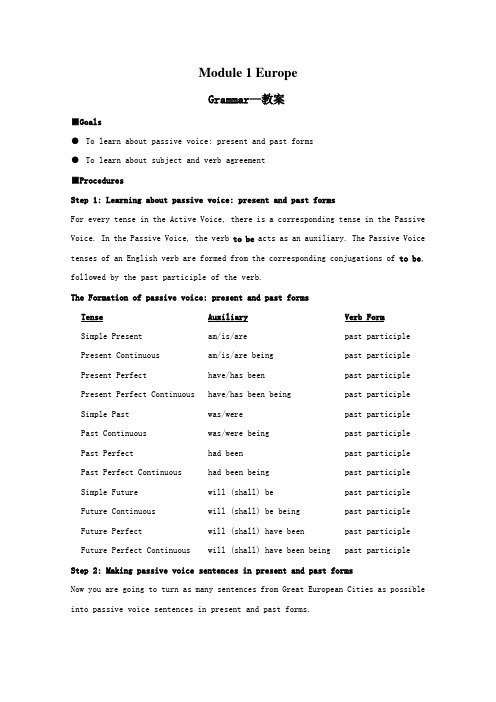
Module 1 EuropeGrammar—教案■Goals●To learn about passive voice: present and past forms●To learn about subject and verb agreement■ProceduresStep 1: Learning about passive voice: present and past formsFor every tense in the Active Voice, there is a corresponding tense in the Passive Voice. In the Passive Voice, the verb to be acts as an auxiliary. The Passive Voice tenses of an English verb are formed from the corresponding conjugations of to be, followed by the past participle of the verb.The Formation of passive voice: present and past formsTense Auxiliary Verb FormSimple Present am/is/are past participle Present Continuous am/is/are being past participle Present Perfect have/has been past participle Present Perfect Continuous have/has been being past participle Simple Past was/were past participle Past Continuous was/were being past participle Past Perfect had been past participle Past Perfect Continuous had been being past participle Simple Future will (shall) be past participle Future Continuous will (shall) be being past participle Future Perfect will (shall) have been past participle Future Perfect Continuous will (shall) have been being past participle Step 2: Making passive voice sentences in present and past formsNow you are going to turn as many sentences from Great European Cities as possible into passive voice sentences in present and past forms.Paris is made the capital of France.Paris is built on the River Seine.Paris is regarded as one of the most beautiful cities in the world.Paris is visited by more than eight million tourists every year.The Eiffel Tower is looked as the most popular place for tourists.The Eiffel Tower is made the famous symbol of Pairs.The Louvre is also found in Paris.The Church of the Sagrada Familia was designed by an architect.The architect is called Antonio Gaudi.The church hasn’t been finished yet.The paintings were produced by great artists.Florence is visited each year by about a million tourists.Athens is found to be the birthplace of western civilization.The Parthenon was built during this period.Greece’s best writers were invited to live in ancient Athens.Other writers were influenced by them.Step 3: Learning about subject and verb agreementBasic Principle: Singular subjects need singular verbs; pluralsubjects need plural verbs.For example: My brother is a teacher. My sisters aremathematicians.The subject of a sentence must agree with the verb of the sentence. How do they agree? They must agree in two ways: in number: singular vs. plural, in person: first, second, or third person.We all know these meanings of "agree," but when we talk about subject-verb agreement; we're talking about something different: matching subjects and verbs according to number. That is, when you have a singular subject, you have to match it with a singular verb form: The boy plays. When you have a plural subject, you must have a plural verb form: The boys play.In short, simple sentences, you should have no problem with agreement. You can hear the problem: The boys plays. When it's wrong, it just sounds funny.Step 4: Summarizing subject and verb agreementStep 4: Absorb information concerning National College Entrance Examination高考链接1. Nobody but Jane ____ the secret. (2005全国)A. knowB. knowsC. have knownD. is known2. All but one _____ here just now. (2004全国)A. isB. wasC. has beenD. were3. Not only I but also Jane and Mary ____ tired of having one examination after another. (2003全国)A. isB. areC. amD. be4. A library with five thousand books _______ to the nation as a gift. (1999全国)A. is offeredB. have offeredC. are offeredD. has offered5. When and where to build the new factory _____ yet. (2001全国)A. is not decidedB. are not decidedC. has not decidedD. have not decided6. The number of people invited ______ fifty, but a number of them ____ absent for different reasons. (1996全国)A. were, wasB. was , wasC. was , wereD. were , were7._____ of the land in that district _____ covered with trees and grass. (2000全国)A. Two fifth, isB. Two fifth, areC. Two fifths, isD. Two fifths , are8. A poet and artist ___ coming to speak to us about Chinese literature and painting tomorrow afternoon. (2006天津)A. isB. areC. wasD. were9.Most of what has been said about the Smiths ____ also true of the Johnsons.(2006安徽)A. areB. isC. beingD. to be10. What we used to think ___ impossible now does seem possible. (2006天津)A. isB. wasC. has beenD. will beStep 5:巩固练习1. This is one of the most interesting questions that ____ asked.A. haveB. hasC. have beenD. has been2. Between then two rows of trees _____ the teaching building.A. standB. standsC. standingD. are3. All that can be done______.A. has been doneB. has doneC. have doneD. were done4. They each _____ a new dictionary.A. hasB. haveC. isD. are5. The singer and the dancer ______ come to the meeting.A. hasB. haveC. areD. is6. I have finished a large part of the book ; the rest _____more difficult.A. isB. areC. wasD. were7. The wounded _______ by the hospital.A. have been taken inB. has been taken inC. have taken inD. has taken in8. Business studies _ a skill-based subject which_ students’ ability to use their knowledge.A.is; testB. is; testsC. are; testD. are; tests9. Behind the discussion about free e-mails __ the idea of how to use the Internet correctly.A. isB. areC. haveD. has10. The excellent service of the waiters __ highly praised. That’s why the restaurant is always full of people.A. wereB. areC. wasD. is。
- 1、下载文档前请自行甄别文档内容的完整性,平台不提供额外的编辑、内容补充、找答案等附加服务。
- 2、"仅部分预览"的文档,不可在线预览部分如存在完整性等问题,可反馈申请退款(可完整预览的文档不适用该条件!)。
- 3、如文档侵犯您的权益,请联系客服反馈,我们会尽快为您处理(人工客服工作时间:9:00-18:30)。
Period 3 Grammar 1; Grammar 2整体设计教材分析本节为语法课, 学习被动语态和句子中的主谓一致, 教师通过讲解和练习, 帮助学生解决英语学习中的难点, 培养抽象思维能力。
动词的语态主要分为两种: 主动语态和被动语态。
主动语态是指主语是谓语动词的执行者, 二者为主动关系。
被动语态是指主语是谓语动作的承受者, 二者为被动关系。
主谓一致指的是句子的谓语动词与其主语在数上必须保持一致, 句子的主语是第三人称单数, 主语是复数, 则谓语动词用复数。
三维目标1. 知识与技能1)Help students revise the subject and verb agreement.2)Help students revise the passive voice in the present and past forms.3)Make them master some grammatical rules.2. 过程与方法1)Motivate students’ enthusiasm in taking part in class.2)Individual work and pair work to make every student work in class.3. 情感与价值Through the study of this period students will surely know more about the passive voice as well as the subject and verb agreement, so that they are able to come up with idiomatic English.教学重点1. Encourage students to sum up grammatical rules themselves.2. Encourage students to apply the grammatical rules to practice.教学难点All types of the subject and verb agreement.教学方法1. Deduction.2. Practice.教学过程→ Step 1 RevisionRevise what we have learned last class.1. Make students discuss in pairs to complete the following table.(Show the following on the screen. )Famous place(s)in the city Other special featuresCity’s name Country thecity belongstoParis France Eiffel Tower, the Louvre Restaurants, ca fés and theatres,famous writersBarcelona Spain The Sagrada Familia /Florence Italy The Uffizi Palace Famous for Renaissance, greatestpaintersAthens Greece The Parthenon The birthplace of westerncivilisation, best writers2. Encourage students to choose a city from the table and introduce it to the whole class using the information.→ Step 2 Grammar 1: Passive Voice1. Ask students to read through the sentences in Activity 1, Page 5 and then discuss with their partner the following questions:1)Wha t does the word “by” in the first three sentences tell you?2)Is there any difference in meaning between these two sentences?Paris is visited by more than eight million tourists every year.More than eight million tourists visit Paris every year.3)Why is the word “by” not in the sentences d and e?(After a few minutes’ discussion the teacher may ask students to answer the questions)Suggested answers:1)It tells us who did the action. (In grammatical terms: It tells us who the agent was. )2)The focus is different. In the first sentence it is Paris which that is more important; while in the second one we are more interested in the tourists.3)In sentence d, because we understand that it means “is known by everyone”, and the inclusion of the agent would be superfluous, while in sentence e because we are not interested in who built it.2. Option OneEncourage students to sum up the structure of Passive Voice.Take the verb “do” as an example.Write the following on the blackboard and give them a few minutes to complete the table.时态主动语态被动语态一般现在时do/does am/is/are+done一般过去时did was/were+done现在进行时am/is/are+doing am/is/are+being+done过去进行时was/were+doing was/were+being+done现在完成时have/has+done have/has+been+done过去完成时had+done had+been+done一般将来时will+do will+be+done过去将来时would+do would+be+done Option TwoShow the grammatical rules on the screen and have students make sense of them.被动语态的结构一般来说, 只有需要动作对象的及物动词(短语)才有被动语态。
动作的执行者一般由介词by 引起的短语来表示(by短语常可以省略)。
被动语态由“助动词be+过去分词”构成。
现以动词do 为例, 列出常用的八种时态的被动语态。
(1)一般现在时: is/am/are+doneHow is this word pronounced?这个单词怎么发音?(2)一般过去时: was/were+doneShe was asked to sing a song.大家要求她唱首歌。
(3)一般将来时: will/shall+be done或is/am/are going to+be doneSome of you will be sent to America for further training.你们中有些人将被送到美国接受进一步的培训。
(4)现在进行时: is/am/are+being doneThe classroom is being cleaned by the students.学生们正在打扫教室。
(5)现在完成时: have/has+been doneAll the work has been finished.所有工作都已完成了。
(6)过去进行时: was/were+being doneMom told me that grandma was being taken good care of in that nursing home.妈妈告诉我奶奶在那个疗养院被照顾得很好。
(7)过去完成时: had+been doneIt was the first time that I had been criticized in public.那是我第一次当众挨批评。
(8)过去将来时: would+be doneHe did know he would be assigned the complex job.他就知道这项复杂的工作会安排给他。
情态动词的被动结构为“情态动词+be done”。
Everything that can be done has been done.能做的都已经做了。
另外, 有些及物动词常常用于被动结构中, 这类动词有be acclaimed, be suspended, be overcome, be indicated, be inferred, be born等。
He has been widely acclaimed for his hard work.他因为工作努力而受到普遍赞扬。
A model plane is suspended above the stage.舞台上方悬挂着一个飞机模型。
I was born in a poor family.我出生在一个贫穷的家庭。
3. Ask students to do Activity 2, Page 5 individually and then call back their answers in a whole-class setting.Suggested answers:1. Florence is visited by about a million tourists each year.2. London was visited by ten million people last year.3. The Mona Lisa was painted by Leonardo da Vinci.4. The Mona Lisa wasn’t painted by Picasso.5. The Great Wall of China was built by thousands of workers.4. Students work in pairs to ask and answer questions in Activity 3, Page5.→ Step 3 Grammar 2: Subject and Verb Agreement1. Make students observe the following sentences and pay special attention to the words in bold.Write the sentences on the blackboard.My family lives in Cardiff.Our soccer team is fantastic.The whole class is here.Ask them to answer the following questions.(Show the following questions on the screen)What have the words family, team, and class got in common?(a)They are all singular nouns.(b)They are followed by a singular verb.(c)They refer to only one person.(d)They refer to a number of people.Suggested answers: b, d2. The teacher may then ask students the following questions:Why do they take the singular verb forms? In which cases will they take the plural forms?(First students discuss in pairs and then the teacher adds something more if necessary. )Possible answers:These words are called collective nouns. As they are regarded as a whole in these sentences, singular verb forms are used here; but if they are considered as individuals the words(th e Subject)will take the plural forms. For example, “The class are listening to the teacher attentively. ” Other collective nouns include audience, group, committee, council, government, crew(船员), union, etc.3. Ask students to finish Activity 2, Page 7.Suggested answers:1. plays2. has3. lives; live(lives)If necessary, the teacher may add some sentences to make sure students master the usage of collective nouns, and otherwise they may fail to understand and use them correctly.(Show the following on the screen. )1. The class_____________ (be)big.2. The class_____________ (be)taking notes at the moment.3. His family_____________ (be)small in the past, but now it_____________ (be)big.4. His family_____________ (be)all soccer fans.5. The team_____________ (have)made progress.6. The team_____________ (have)all forgot the meeting.Suggested answers:1. is2. are3. was; is4. are5. has6. have4. Observe the following sentences and then try to answer a few questions.(Show the sentences and questions on the screen. )a. Neither Amy nor Helen is English.b. Neither of them is English.c. None of them has arrived yet.d. Each country in the United Kingdom has a capital city.e. Each of them has a capital city.Q: 1)Do the first and second sentences mean the same thing?2)Do we know how many people the third sentence refers to?3)The fourth and fifth sentences refer to countries. Do we know how many countries they refer to?(After a moment, call back their answers)Suggested answers:1)Yes, they do.2)More than two.3)No, we don’t, except that there must be two or more.5. Have students rewrite the sentences using neither, nor or each.(Show the sentences on the screen. )1)Amy and Helen can’t speak Chinese.2)All the countries in Europe have a good soccer team.3)France and Germany aren’t going to sign the agreement.4)The whole class doesn’t want to study Japanese.Suggested answers:1)Neither Amy nor Helen can speak Chinese.2)Each country in Europe has a good soccer team.3)Neither France nor Germany is going to sign the agreement.4)None of the class wants to study Japanese.→ Step 4 Summary and HomeworkThrough the study of this period we have revised Passive Voice as well as Subject and Verb Agreement. In the course of learning not only were we able to learn something more about the grammar, but we also learned to sum up grammatical rules themselves, which were quite helpful.Homework: Do Workbook Exercises about the Grammar.板书设计Module 1 EuropePeriod 3 Grammar 1; Grammar 2Grammar 1 Passive VoiceSum up the structure of Passive Voice时态主动语态被动语态一般现在时do/does am/is/are+done一般过去时did was/were+done现在进行时am/is/are+doing am/is/are+being+done过去进行时was/were+doing was/were+being+done现在完成时have/has+done have/has+been+done过去完成时had+done had+been+done一般将来时will+do will+be+done过去将来时would+do would+be+doneGrammar 2 Subject and Verb AgreementThe class are listening to the teacher attentively.Collective nouns: audience, group, committee, council, government, crew(船员), union, etc.活动与探究1. Look up as many prepositional phrases as possible in describing location.2. Practice describing location.。
